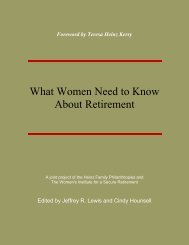What Women Need to Know About Retirement - Wiser
What Women Need to Know About Retirement - Wiser
What Women Need to Know About Retirement - Wiser
Create successful ePaper yourself
Turn your PDF publications into a flip-book with our unique Google optimized e-Paper software.
� Income that could come from part-time work or starting a new business from home.<br />
� Money from selling your home and moving <strong>to</strong> a smaller one or <strong>to</strong> a less expensive area.<br />
� Taking out a reverse mortgage on your home.<br />
� Money saved by cutting down on your expenses.<br />
� Any continued medical benefits available through your or your spouse’s employer.<br />
� Income from selling certain personal property that you will no longer need in retirement,<br />
such as second homes, extra family cars, jewelry, clothing, <strong>to</strong>ols used for work, etc.<br />
� Any long-term care insurance that you currently own.<br />
� Life insurance policies that could be converted <strong>to</strong> cash or monthly income, or used <strong>to</strong><br />
provide cash for your survivor.<br />
Examine Your Financial Issues<br />
Once you have a handle on what resources will be available <strong>to</strong> you in retirement, think through<br />
what financial needs you might have. Realize that the longer you work, the more money you can<br />
accumulate and the less money you will need. Your key financial issues include:<br />
� Your needs at the time of retirement.<br />
� The impact of retirement timing on Social Security benefits for you and your spouse.<br />
� Your willingness <strong>to</strong> keep some money in the s<strong>to</strong>ck market.<br />
� The cost of health insurance <strong>to</strong> supplement Medicare.<br />
� Future inflation that will make everything cost more over time, especially medical care.<br />
� For couples, the needs of the survivor after one partner dies.<br />
� Potential expenses if one or both spouses need special care or become frail.<br />
� Potential requests for help from parents, children and other family members.<br />
� The need for a financial cushion <strong>to</strong> absorb unexpected costs, such as rising property<br />
taxes.<br />
� Your retirement dreams, including special travel wishes and the desire <strong>to</strong> add a seasonal<br />
or vacation home.<br />
Employer-Sponsored Pension and Savings Plans<br />
Let’s take a closer look at employment-based pension and retirement savings plans, and cover<br />
ways you can make the most of them. For those companies sponsoring pension plans, there are<br />
two basic types:<br />
A defined benefit plan is a traditional pension plan with benefits based on the individual’s years<br />
of work for the company and other fac<strong>to</strong>rs, such as level of pay. The defined benefit plan tells<br />
you exactly how much money you will receive, such as a payment of $500 a month. The<br />
benefits are typically paid out over your lifetime, or over the lifetime of you and your<br />
beneficiary.<br />
If a private sec<strong>to</strong>r plan is discontinued or is unable <strong>to</strong> pay benefits, a federal corporation known<br />
as The Pension Benefit Guaranty Corporation (PBGC) takes over the plan and makes the benefit<br />
payments (up <strong>to</strong> a certain limit).<br />
A defined contribution plan is a retirement savings plan that pays benefits equal <strong>to</strong> the amounts<br />
contributed <strong>to</strong> employees’ individual accounts plus investment gains or losses.<br />
51




